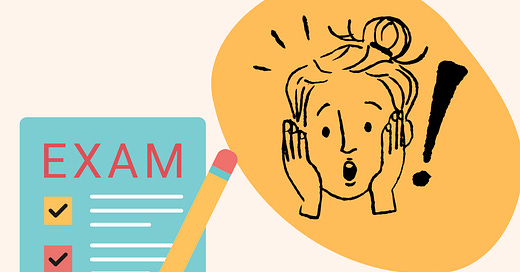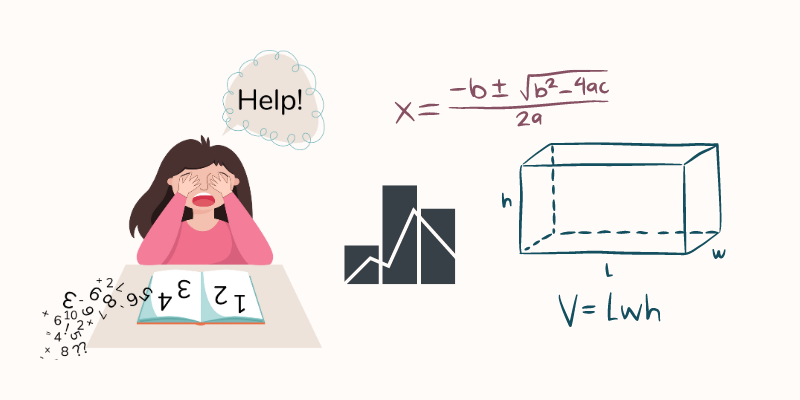Adulting 105: How to Study Again
#4: How I tried to unlock my mathematical and critical thinking skills after several years out of school in order to overcome the GMAT.
Once I decided to do an MBA, I jumped on the list of to-dos quickly. I looked up schools, their requirements, the cost, etc. and found a major blocker - the GMAT/GRE test requirement. I had written the GRE in 2016 but my scores had sadly expired a few months back. I balked at the thought of having to go through an exam like that again. And I questioned if the tests were even good indicators of talent and why they were still necessary. But sadly, they are a devil we have to deal with.
Nowadays business schools weigh the GRE and GMAT equally and I had scored a 332 in GRE, so a part of me was confident I could score well again. Logically, in the GRE vs. GMAT debate, GRE was the best choice for me. Unfortunately, the part of me which gets bored easily did not like it. That part craved variety. Hence, I decided to go the less sensible but more stimulating route - I opted for the GMAT. And yes, there were several times over the next few months when I cursed my novelty seeking impulses.
Long story short, I prepared for 2-3 months by myself and scored in the 99th percentile (760). In this post, I thought I could share some of the lessons I learnt along the way in the hopes that it may help someone else.
How to start?
The Number One Rule: Don’t trust Google. Be aware that if you type in “How to study for the GMAT”, it will throw a million things at you. Majority of those links are out promising great scores, blah, blah, BUT for a bucket load of money. Growing up in India, I had seen enough of these test-prep “gurus” and developed a natural aversion to them, and so I tried my best to steer clear of the self-proclaimed GMAT gurus. Moreover, I strongly believe that anyone can clear these exams through self-study with some hard work and strategy.
But let me rewind a bit. In the beginning, I was actually more like this:
I found it difficult to do simple math. Like even, What is 5% of 20? Brain: Blank. My mind proved incapable of a single useful numerical thought. And when it came to grammar, I was even more lost. I felt so out-of-loop even though I work in a highly technical field and had left school barely three years back.
So, before I could start the actual prep, I had to first defrost my brain.
Here are some steps I took to start thinking again:
I cut out TV before 9 PM.
Stopped social media use as much as possible.
I read more literary novels and also a couple of books on grammar.
Started maintaining a journal.
Crosswords, wordle, sudoku, etc.
Took longer walks with my dog and chose nature-heavy trails.
Cut out coffee and started drinking more black tea.
Bought a GAN (Rubik’s) cube and fancied myself a speedcuber1.
More yoga and pilates.
Less alcohol and junk food.
Looking at this list now, it seems like a lot. And if you had glanced over them skeptically - you would be partly right. Because, in reality, I didn’t do a single one of those perfectly. I did 60-70% of each task and none as regularly as I wanted to. Thankfully, even those half-baked efforts of mine paid off. I felt my mind become sharper and my mental blocks grew smaller and farther in between.
Indeed, these efforts changed my whole life for the better. It felt like a dense fog had been pulled out from my brain and suddenly there was sunshine everywhere. I could think quickly again, I could do math and judge critically! I hadn’t realized how much the 9-5 slog and general adulting slows your brain until experiencing it myself. I vowed to never let my mind dull that way again and am still trying my best to keep that up.
On the GMAT: Tips and Tricks
Finally, after a month or so of “warm-up”, I got around to actively preparing for the test and discovered a few things along the way. Here are my top suggestions/takeaways on how to succeed in the GMAT:
Stick to the resources available on the Main GMAT website.
Go through the GMAT Prep tools provided by the GMAC2 and pay for the online access.
Advantage: Online Portal. Firstly, you can go through them on your laptop or your phone. It's accessible and you won't have to lug a heavy book around. Secondly, the online portal keeps track of the questions you have already faced, which ones you got wrong, which ones are especially hard, etc. This helped me pick and choose the kind of questions I wished to work with that day. For example, I would let the randomizer choose questions from all the ones I had gotten wrong earlier so that I can go through them again and see how I fared the second time around. Finally, you can customize according to your goal for the day and use the solutions provided to hone your skills. Or you can choose to do a relaxed session. Sometimes, I would do 10 grammar questions and call it a day.Attempt at least 4-6 of the official practice tests. It's worth spending money on buying access to those. They will also help you practice Essay Writing. Don’t skip those sections, instead use them to design a common blueprint for your arguments.
Analyze your practice sessions and keep a track of the questions you make mistakes in. More often than not, a pattern would emerge.
I was able to identify my weak areas and then think up ways to handle them. For example, in English, grammar was my weak point which is why I borrowed books on grammar and improved my understanding outside of the GMAT sphere. Pretty soon, I realized that there was a learnable pattern even there. In math, my weakness was Permutations and Combinations (ugh) and I found older GMAT resources and analyzed more of those question types before settling on a strategy.
Know that the GMAT is a different beast compared to the GRE. The GRE can be tackled through rote learning and 9th grade math and reading skills. The GMAT requires you to actually apply that knowledge in skillful ways. At times, I couldn’t help but admire my oppressor.
The key to GMAT Prep is consistency and critical thinking. The quantity of prep you do matters much less than the quality.
That is all I can remember at the moment. If you would like to learn more or have any specific questions, please let me know!
By the time the actual test date rolled around I was very nervous. I doubted if I would be able to take an exam after so many years. I worried that my mind would go blank. I questioned if I had practiced enough or if I would be able to answer all the questions in time. I sat anxiously in the waiting room and again at my assigned desk. I took several deep breaths before finally pressing the START button.
My main lesson here: Nervousness and fear before an exam are inevitable and don’t magically disappear with age :(. The best way to combat them would be to prepare well and let your muscle memory take over.
Because once you get into the flow of things, the fear disappears.
https://en.wikipedia.org/wiki/Speedcubing
Graduate Management Admission Council - https://www.gmac.com/





Taking inspiration from you, I'm going to try to be more offline. I know it leads to more productivity and a clearer mind.
Me too! Taking pointers to prep of another certification I am required to take